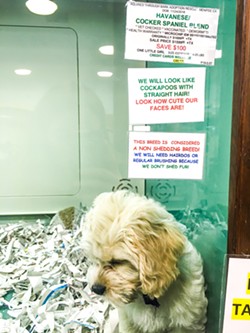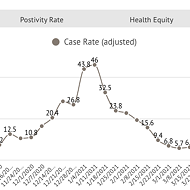Friday, September 25, 2020
State bans sale of dogs, cats, and rabbits in stores
Posted By Kasey Bubnash on Fri, Sep 25, 2020 at 4:44 PM
“Adopt don’t shop” is becoming more than just a catchy slogan coined by animal rights activists. It’s slowly becoming state law.
Just a day before “Puppy Mill Awareness Day” on Sept. 19, Gov. Gavin Newsom signed a bill effectively banning the retail sale of dogs, cats, and rabbits in California pet stores. Under the new restrictions laid out in Assembly Bill 2152, pet stores will be able to partner with animal shelters and rescue organizations to hold adoption events, but will not be allowed to accept any compensation for the adoptions.
“In California, we are putting an end to the cruel puppy mill industry for good,” Newsom said in a Sept. 18 press release. “I am proud to sign this legislation to advance California’s nation-leading animal welfare protections and help more pets join loving families.”
AB 2152 is part of a long-running effort to reduce demand for animals that are irresponsibly bred in poor conditions and large numbers—often referred to as “puppy mills”—while increasing demand for the millions of already available shelter animals that are often killed if not adopted. The new bill builds upon an existing law that went into effect in 2019 and requires pet retailers to obtain dogs, cats, and rabbits from animal shelters or rescue groups, and prohibits stores from sourcing directly from breeders.
Although animal rights activists considered that law a step in the right direction, many say it didn’t go far enough, and pet stores across the state—including now-closed local pet store Animal Kingdom—were accused of buying animals from mass breeders disguised as shelters.
In March 2019, animal rights groups Bailing out Benji and Animal Legal Defense Fund filed a lawsuit against Animal Kingdom and a shelter it was using to obtain animals, Bark Adoptions, claiming the organizations circumvented state law by selling commercially purebred puppies falsely labeled as rescues.
In San Diego, stores that listed Bark Adoptions as a sourcing shelter were fined hundreds of dollars per pet after an investigation concluded that the "shelter" had not received nonprofit status and was likely a front for mass breeders hoping to get their animals into stores. San Luis Obispo County Animal Services found similar issues with the dogs from Bark Adoptions available at Animal Kingdom but Animal Services Manager Eric Anderson said in a 2019 interview with New Times that the store was able to provide the county with proof that Bark Adoptions had received 501(c)(3) tax exemption status.
Still, Animal Kingdom closed its stores in Santa Maria and Pismo Beach in April 2019, citing revenue losses related to the changes in state law and lawsuits filed against the store and Bark Adoptions. A few months later in July 2019, Animal Kingdom closed its last remaining location in Grover Beach.
Neil Trent is currently the CEO of Woods Humane Society, but before that he worked alongside animal control departments in Southern California when the initial pet stores law went into effect at the beginning of 2019. Trent said he helped conduct raids on a number of pet stores that were “clearly” selling puppies from puppy mills that had gained nonprofit status to pose as shelter and rescue operations.
He’s not sure how the new law will impact Woods—which takes in about 3,000 animals per year, usually from other shelters and animal control operations with lacking capacity—but he’s glad the state is cracking down.
“We were very pleased to see that the governor has moved forward to try to shut this loophole down,” Trent told New Times. ∆
Just a day before “Puppy Mill Awareness Day” on Sept. 19, Gov. Gavin Newsom signed a bill effectively banning the retail sale of dogs, cats, and rabbits in California pet stores. Under the new restrictions laid out in Assembly Bill 2152, pet stores will be able to partner with animal shelters and rescue organizations to hold adoption events, but will not be allowed to accept any compensation for the adoptions.
“In California, we are putting an end to the cruel puppy mill industry for good,” Newsom said in a Sept. 18 press release. “I am proud to sign this legislation to advance California’s nation-leading animal welfare protections and help more pets join loving families.”
AB 2152 is part of a long-running effort to reduce demand for animals that are irresponsibly bred in poor conditions and large numbers—often referred to as “puppy mills”—while increasing demand for the millions of already available shelter animals that are often killed if not adopted. The new bill builds upon an existing law that went into effect in 2019 and requires pet retailers to obtain dogs, cats, and rabbits from animal shelters or rescue groups, and prohibits stores from sourcing directly from breeders.
Although animal rights activists considered that law a step in the right direction, many say it didn’t go far enough, and pet stores across the state—including now-closed local pet store Animal Kingdom—were accused of buying animals from mass breeders disguised as shelters.
In March 2019, animal rights groups Bailing out Benji and Animal Legal Defense Fund filed a lawsuit against Animal Kingdom and a shelter it was using to obtain animals, Bark Adoptions, claiming the organizations circumvented state law by selling commercially purebred puppies falsely labeled as rescues.
In San Diego, stores that listed Bark Adoptions as a sourcing shelter were fined hundreds of dollars per pet after an investigation concluded that the "shelter" had not received nonprofit status and was likely a front for mass breeders hoping to get their animals into stores. San Luis Obispo County Animal Services found similar issues with the dogs from Bark Adoptions available at Animal Kingdom but Animal Services Manager Eric Anderson said in a 2019 interview with New Times that the store was able to provide the county with proof that Bark Adoptions had received 501(c)(3) tax exemption status.
Still, Animal Kingdom closed its stores in Santa Maria and Pismo Beach in April 2019, citing revenue losses related to the changes in state law and lawsuits filed against the store and Bark Adoptions. A few months later in July 2019, Animal Kingdom closed its last remaining location in Grover Beach.
Neil Trent is currently the CEO of Woods Humane Society, but before that he worked alongside animal control departments in Southern California when the initial pet stores law went into effect at the beginning of 2019. Trent said he helped conduct raids on a number of pet stores that were “clearly” selling puppies from puppy mills that had gained nonprofit status to pose as shelter and rescue operations.
He’s not sure how the new law will impact Woods—which takes in about 3,000 animals per year, usually from other shelters and animal control operations with lacking capacity—but he’s glad the state is cracking down.
“We were very pleased to see that the governor has moved forward to try to shut this loophole down,” Trent told New Times. ∆







 2023 Pet Photo Contest Winners
2023 Pet Photo Contest Winners
 Winning Images 2023
Winning Images 2023
